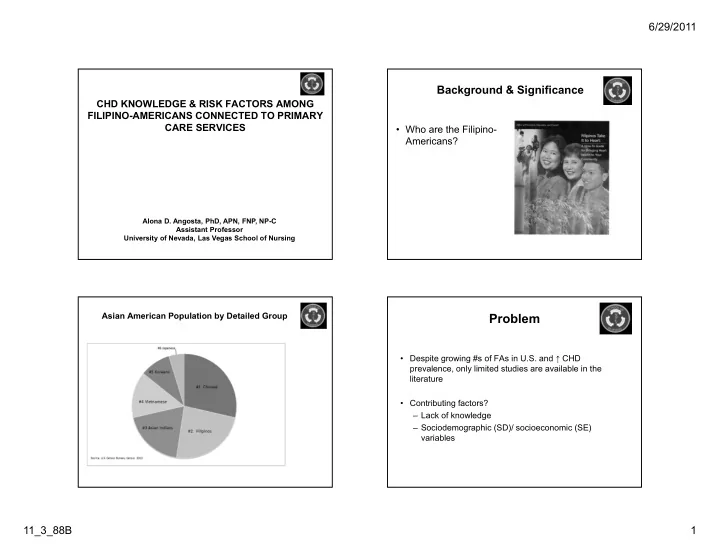

6/29/2011 Background & Significance CHD KNOWLEDGE & RISK FACTORS AMONG FILIPINO-AMERICANS CONNECTED TO PRIMARY CARE SERVICES • Who are the Filipino- Americans? Alona D. Angosta, PhD, APN, FNP, NP-C Assistant Professor University of Nevada, Las Vegas School of Nursing Asian American Population by Detailed Group Problem • Despite growing #s of FAs in U.S. and ↑ CHD prevalence, only limited studies are available in the literature • Contributing factors? – Lack of knowledge – Sociodemographic (SD)/ socioeconomic (SE) variables 11_3_88B 1
6/29/2011 Purpose of the Study Research Design, Sample, Setting • Non-experimental design, descriptive • Examine the CHD knowledge & risk factors of FAs • N = 120 • Describe the relationships between knowledge, SD and SE characteristic variables among FAs • 3 primary care clinics in Las Vegas, NV (Sociodemographic: age, gender, education. Socioeconomic: employment status, income, # jobs) Measurement • Heart Disease Fact Questionnaire (HDFQ) – 21 true or false questions – Reliable (internal consistency) on previous studies RESULTS – Valid (discriminant function analyses) previously tested • Demographics Questionnaire – Assessment of: • SD and SE variables • CHD risk factors Source: Wagner et al., 2005a, Wagner et al. 2005b. 11_3_88B 2
6/29/2011 Education level ( N =120) SD Characteristics • Gender – Women (59%) – Men (41%) • Age ( M =54 yrs, SD=10.04) • Education Employment Status ( N =120) SE Characteristics • Employment status (78% were employed) • # of jobs (86% had 1 job) • Annual income 11_3_88B 3
6/29/2011 # of Jobs ( N =120) Annual Income ( N =120) CHD Risk Factors in FAs ( N =120) CHD Knowledge of FAs • Total CHD Knowledge questionnaire points: 21 • CHD Knowledge Score ( N = 120) : • Total correct score ( M =15.8, SD =4.26) • Total correct percent (M=75%, SD=20.27) • ↑ CHD knowledge scores in women than men ( t = 2.438, p = .016) 11_3_88B 4
6/29/2011 Relationship between CHD Knowledge, Relationship between CHD Knowledge, SD/SE variables SD/SE variables • Gender and CHD Knowledge • Age and CHD Knowledge • Significant relationship ( r = .219, p = .016) • No relationship ( r = - .099, p = .284) • Education and CHD Knowledge • Mean score of CHD knowledge differed by education level ( F = 7.95, p = .001). • Employment and CHD Knowledge • No relationship ( r = - .141, p = .125) • Income and CHD Knowledge • Mean score of CHD knowledge differed by income level ( F = 2.67, p = .018). Predictors of CHD Knowledge • Gender DISCUSSION • ( β = .190, t = 2,21, p = .029) • Education • ( β = .256, t =2.85, p = .005) 11_3_88B 5
6/29/2011 SD/SE Characteristics CHD Knowledge • level of CHD knowledge • Middle adulthood age – Connected to primary care services • Highly educated – Highly educated sample • Close family ties • Majority were employed, had 1 job • Women vs. Men • 1st generation FAs – Women had higher CHD knowledge scores than • Comfort with health care provider having same culture men and ethnic background • ↑ Heart health awareness programs • Inclusion of women in research CHD Risk Factors in FAs CHD Risk Factors in FAs • DMT2 • Lack of regular exercise – Dietary lifestyle, diet, lack of exercise, obesity, – No time, no motivation, work, difficulty managing genetics. health habits, health problems, knowledge deficit on benefits of exercise, ↑ age. • Obesity and Abdominal adiposity – Dietary lifestyle, diet, lack of exercise • Dyslipidemia – Dietary lifestyle, FA diet, lack of exercise, genetics 11_3_88B 6
6/29/2011 • ↑ CHD knowledge scores , + CHD risk factors • Education level • Possible reasons: – Highly educated participants had higher mean scores • Not knowing true definition of CHD and/or its – Consistent with literature finding complications, • education = cognitive function and better comprehension capability • Health behaviors, • Perception of risk including underestimation of CHD risk, • Cultural factors Source: Barcelo et al., 2009; Kang et al., 2010; Shaw et al., 2008. Limitations Predictors of CHD Knowledge • Small sample ( N =120) • Education level • Limited setting – Primary care clinics • Gender – Las Vegas • HDFQ and Demographics tools – Revised tool – First study to use these instruments in FAs 11_3_88B 7
6/29/2011 Recommendations Recommendations • Replicate study using larger sample outside primary • Examine the barriers of physical activity as this is highly care services, prevalent in this population • Compare 1 st generation versus 2 nd generation FAs in • Compare CHD risk factors between FA women and men their CHD knowledge and CHD risk factors, (equal sample) • Examine the impact of dietary lifestyle (acculturation, • Compare CHD risk factors between FAs and other ethnic westernization of diet) on CHD and its risk factors, groups (i.e. African-Americans) Implications for Nursing • Primary Prevention Intervention – Education on CHD prevention, Health promotion Conclusion • Promote exercise • Promote healthy diet • Cultural awareness • Secondary Intervention – Education on ways to risk of CHD development • Lifestyle modification (i.e. exercise, diet, and weight loss) • Smoking cessation • Pharmacological compliance (including education on meds) • Regular follow up with health care provider • Finding resources for patients if needed. 11_3_88B 8
6/29/2011 QUESTIONS ? 11_3_88B 9
Recommend
More recommend